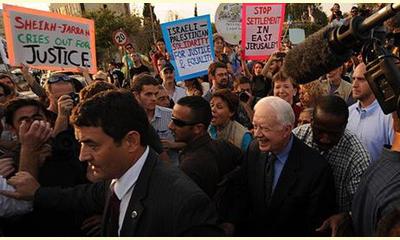|
|
The Elders support Palestinian move to sign international treaties
un articulo por The Elders
The Elders support Palestinian move to sign
international treaties. "This move should not be
seen as a blow to the peace talks”– Jimmy Carter.

photo from The Elders
click on photo to enlarge
The Elders are deeply worried by the impasse in
peace negotiations between Israelis and
Palestinians. They express their continued support
to US Secretary of State John Kerry and commend
him for his tireless effortsto bring the parties
together.
The Elders take note of Palestinian President
Mahmoud Abbas’ decision to sign letters of
accession to 15 international treaties. They
recognise that this move is consistent with the UN
non-member observer state status obtained by
Palestine in November 2012.
Gro Harlem Brundtland, former Prime Minister of
Norway and Deputy Chair of The Elders, said: “As a
UN non-member observer state, Palestine is
entitled to join international bodies. We welcome
President Abbas’ decision to sign the Geneva
Conventions and other important international
human rights treaties.
“This move opens the way to more inclusive and
accountable government in the West Bank and Gaza .
It has the potential to strengthen respect for
human rights and provide ordinary Palestinians
with essential legal protections against
discrimination or abuses by their own government.
In global terms, it will also increase their
ability to enjoy, in practice, the protection of
their basic rights granted to them by
international law.”
Former US President Jimmy Carter said: “The
decision by the Palestinians to exercise their
right to join international organisations should
not be seen as a blow to the peace talks. I hope
that, on the contrary, it will help to redress the
power imbalance between Israelis and Palestinians,
as we approach the 29 April deadline set by
Secretary Kerry. More than ever, both parties
urgently need to make the necessary compromises to
reach a lasting peace with two states, Israel and
Palestine, living side by side in peace and
security.”
The Elders have long supported the recognition of
Palestinian statehood by the United Nations. In
July 2013, they welcomed US efforts to restart
Israeli-Palestinian peace talks, after a meeting
with John Kerry in Washington DC.
The Elders are independent leaders using their
collective experience and influence for peace,
justice and human rights worldwide. The group was
founded by Nelson Mandela in 2007.
The Elders are Martti Ahtisaari, Kofi Annan (Chair),
Ela Bhatt, Lakhdar Brahimi, Gro Harlem Brundtland
(Deputy Chair), Fernando Henrique Cardoso, Jimmy
Carter, Hina Jilani, Graça Machel, Mary Robinson and
Ernesto Zedillo.
Desmond Tutu is an honorary Elder.
Read more about The Elders' work on Israel-
Palestine: http://www.
theelders.org/israel-palestine
|








|
DISCUSSION
Pregunta(s) relacionada(s) al artículo :
How can a culture of peace be established in the Middle East?,
* * * * *
Comentario más reciente:
Here is another view of the Hamas/Fatah agreement, sent to CPNN by the Palestinian peace activist, Mazin Qumsiyeh:
People asked me about the latest "reconciliation" agreement between Fatah and Hamas. Most Palestinians here are skeptical of the sincerity of leadership in Fatah and Hamas and most still think these leaders are driven by narrow factional and personal interests than by interest of Palestine; noticeably absent was the popular Front For the Liberation of Palestine (PFLP), the largest secular faction after Fatah. Women leaders also complained about the exclusion of women voices and youth were also absent as most of those politicians are my age or older. In my talks (and I give several every week to visiting delegations and local people), I emphasize that people must wake up and push politicians to do the right thing. That is how history changes: via people especially youth and women. Of course, many wish that politicians show some leadership for positive change but we the people have to act. Meanwhile, we have an ongoing slow genocide of the Palestinian people. 7.4 million are refugees/displaced people and that number keeps growing. . ... continuación.

|
|









